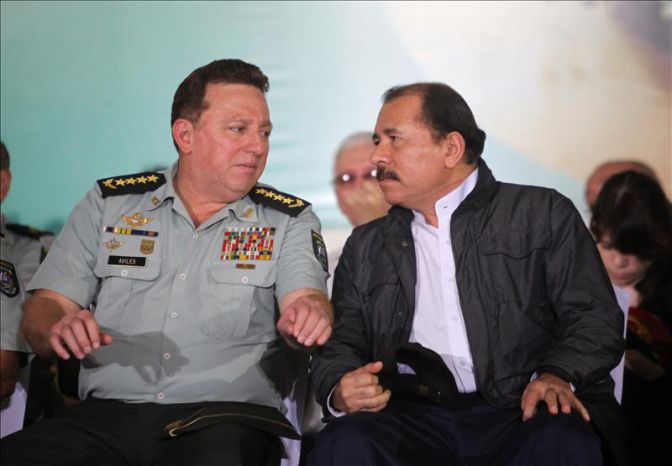13 de diciembre 2018

Ortega Grants Chinese Company a Huge Mining Concession

PUBLICIDAD 1M
PUBLICIDAD 4D
PUBLICIDAD 5D
“At least say: ‘stop the massacre.’ (But) the Army commander does not have political authority” to do it, says Roberto Cajina.

“At least say: ‘stop the massacre.’ (But) the Army commander does not have political authority” to do it
The letter sent last week by the Blue and White National Unity (UNAB) to the Chief of the Nicaraguan Army, General Julio Cesar Aviles, “has to force the military command” to reflect on the position of this institution regarding the social, economic and political crisis affecting the country, said Roberto Cajina, defense and national security expert, during an interview in the televised program “Esta Noche” (Tonight).
“I have always talked about a complicit silence. However, from the perspective of military ethics, the Army has an obligation to speak out. At least say: ‘Stop the massacre, the illegal arrests, the tortures,’ and tell that to the regime. The problem is that the Army Commander (General Julio Cesar Aviles), does not have the political and moral authority to do so,” said Cajina.
During the XXIII graduation of the Center for Advanced Military Studies held this Tuesday at the Olof Palme Convention Center, Ortega again imposed the FSLN party flag on a par with the blue and white (flag of Nicaragua), a gesture that has been criticized by the citizenry.
The Army have also been questioned by Nicaraguan society during these almost eight months of crisis. It has been accused of being an accomplice of the regime of President Daniel Ortega and Vice President Rosario Murillo. In fact, the latest “Latinobarometro” (Latin-Barometer) survey revealed that citizen confidence in this institution fell from 45% to 22%.
“The Nicaraguan Army has lost its’ legitimacy at this moment and should be of concern for the institution,” Cajina said.
The defense expert affirmed that there are “large holdings of the Army in US investment companies, totaling more than 40 million dollars.” The military institution also has important investments in BDF (a bank) and property development in Nicaragua. It is a shareholder of the American University (UAM) and manages the Institute of Social Military Insurance.
Ortega’s message to the Army
Last week, at the closing ceremony of the 16th Congress of the Nicaraguan National Students Union (UNEN), President Ortega attacked his brother, the retired general and ex-chief of the Sandinista Popular Army, Humberto Ortega, whom he labelled as having become a pawn of imperialism and the oligarchy, during the transition period in the 1990s.
For Cajina this attack although personal, is also a message to the armed institution. According to this defense expert, what the president did was to tell the Army “not to do what Humberto did in 1990,” when he curbed a destabilization process of aggression and attacks by the Sandinista Front on Violeta Chamorro’s Government.
“The message to the military institution is: ‘Look what Humberto Ortega did in 1990. Do not do it, do not leave me alone.’ At the end of the day, it is a request for a lifejacket that Daniel Ortega makes to the Army. Because the Army is not directly involved in the massacre, in the genocide in this country,” he stated.
Humberto Ortega was an important factor in the elimination of partisanship and professionalization of the Army. These two facts are associated with his management and were part of the transition agreements signed by the former chief of the Sandinista Popular Army with Antonio Lacayo, Minister of the Chamorro Government Presidency.
“There, the professionalization of the Army was raised, non-partisanship, budget reduction, and also a reduction in the number of troops was proposed. In this country, to ignore the role that Humberto Ortega and the Army played at the beginning of the democratic transition is to be blind,” the expert reaffirmed.
The purification of the Army
The Nicaraguan Army has a pyramidal structure in which normally many of its officers are sent to retirement when they reach a certain age or time in their ranks. On November 19, four coronels, 26 lieutenant coronels and 5 majors retired.
“Last year there were nine (majors), and my understanding from the information I have, they were sent to retirement for reasons related to political criteria, for their comments. That’s to say, in the middle of what is called the normal process of retirement, there is also some kind of purification. I think there is a distrust of the current command of the Army in the succession of the military command,” said Cajina.
In 2020, General Aviles will have served ten years as head of the Nicaraguan Army. Before his eventual exit, the Military Council should be the one in charge of deliberating which is the future of the institution at this moment of crisis.
“The Army is entering a phase of political decomposition, to give it a name. I do not think that there are more than 120 original founders of the Army. That is, the current lieutenant coronels, are no longer from the original gang, those that came out of the guerrilla [who fought Somoza] and founded the Army,” stated Cajina.
He further noted that “the great fear of the military institution” is that continuity will be lost, which is not ideological, but “somehow political,” which does not have the philosophical sustenance of Augusto C. Sandino or Benjamin Zeledon.
Today that does not exist anymore and what is there is a relationship rather, in my opinion, of institutional corporate interests, with individual corporative interests,” Cajina concluded.
Archivado como:
PUBLICIDAD 3M
Periodista. Investiga temas de medio ambiente, corrupción y derechos humanos. Premio a la Excelencia Periodística Pedro Joaquín Chamorro, Premio de Innovación Periodística Connectas, y finalista del premio IPYS en el 2018.
PUBLICIDAD 3D